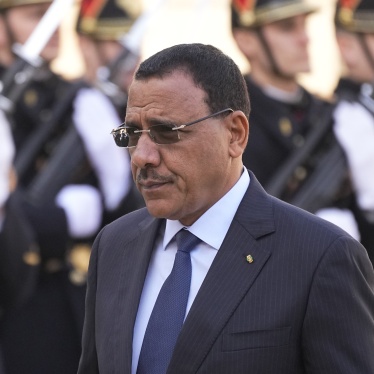(Brussels) - The International Criminal Court took an important step toward bringing justice for atrocities in Uganda by issuing arrest warrants for alleged perpetrators. Governments must now help to bring about the prompt arrest and transfer of these individuals to the court.
After a year-long investigation, the International Criminal Court issued sealed arrest warrants for Joseph Kony, leader of the rebel Lord's Resistance Army (LRA), Vincent Otti, the second in command, and three other leaders of this rebel group. The LRA has waged war in northern Uganda against the country's government for the last 19 years. The ICC chief prosecutor confirmed this information today, following the judges' decision to unseal the warrants.
"The people of northern Uganda have long suffered terrible abuses without any chance of redress," said Richard Dicker, director of Human Rights Watch's International Justice Program. "With today's arrest warrants, the ICC has opened the door for justice to be done."
The ICC Chief Prosecutor said that Joseph Kony will be charged with 12 counts of crimes against humanity and 21 counts of war crimes, including murder, inducing rape, intentionally directing an attack against a civilian population and forced enlisting of children.
Children have been the primary victims of rebel abuses. Human Rights Watch has documented how the Lord's Resistance Army has abducted thousands of children and brutalized them, forcing them to serve as child soldiers. The rebel group has also committed widespread killings of civilians, torture, mutilations and sexual abuse, including rape and forced marriages of girls to rebel commanders.
"These arrest warrants are only a first step," said Dicker. "If the warrants are to mean anything, governments must act now to arrest the accused."
The ICC has no police to enforce its arrest warrants; its success depends on assistance and cooperation from states. Under the ICC treaty, states parties such as Uganda and the Democratic Republic of the Congo have a legal obligation to search for, arrest and transfer the accused to the Court. Some of the accused were reported to have sought refuge in the Democratic Republic of the Congo in September. Their whereabouts today is not certain.
Human Rights Watch called on Ugandan authorities as well as the Lord's Resistance Army to ensure that the issuance of arrest warrants does not jeopardize children who were abducted and forced to serve as rebel combatants, other abductees still in rebel captivity, or civilians living in the vicinity of LRA forces. The ICC itself must also implement effectively protection measures to monitor and ensure the safety of witnesses and victims in northern Uganda.
Research by Human Rights Watch indicates that the Lord's Resistance Army continues to commit the majority of atrocities in northern Uganda, but Human Rights Watch has also documented serious abuses against civilians by the government army, the Uganda Peoples' Defence Forces (UPDF).
In a report issued on September 20, Human Rights Watch documented several extrajudicial killings and many beatings, arbitrary detentions, rapes and sexual assaults committed by the Ugandan government troops in the past year. According to numerous witnesses and victims of these abuses, the Ugandan military as well as civilian authorities have failed to prosecute or otherwise meaningfully discipline soldiers and officers responsible for abuses in the north-with few exceptions.
"The ICC must also look into abuses committed by the Ugandan army," said Dicker. "If the court finds that these crimes don't fall within its limited mandate, it should make its findings available to the Ugandan authorities so that they can bring the perpetrators to justice. In doing so, the court must also be mindful of the security and confidentiality of its sources."
Human Rights Watch called for Uganda to conduct meaningful national prosecutions to supplement the ICC's investigation. In addition, a truth-telling process would give people in northern Uganda a forum in which they could tell their stories and account for human rights abuses that occurred during the nineteen year long war. This process could work alongside traditional reconciliation measures in which those affected wish to participate.
The ICC should make efforts to explain its role and mandate to the communities most affected in northern Uganda, in whose names justice is being done, said Human Rights Watch.
The ICC only has jurisdiction over systematic and widespread war crimes, crimes against humanity and genocide committed after July 2002. Because its mandate is limited to the prosecution of those bearing the greatest responsibility, the ICC will likely prosecute only a few high-ranking perpetrators.
Key facts on northern Uganda:
The civil war between the rebel Lord's Resistance Army and the Ugandan government has been going on since 1986, when the government first came to power. Since then, some 30,000 children have been abducted by the LRA and forced to serve as soldiers or sexual slaves to rebel commanders.
Every night, as many as 40,000 children-known as "night commuters"-flee their homes in the northern Uganda countryside to seek the relative safety of the towns, in order to escape abduction by the LRA. At least 1.3 million people have been displaced in northern Uganda and live in government-controlled camps.
|
News Release
ICC Takes Decisive Step for Justice in Uganda
Governments Must Cooperate to Ensure Arrest Warrants Are Served
Your tax deductible gift can help stop human rights violations and save lives around the world.
Most Viewed
-

-
December 15, 2024
Sudan: Fighters Rape Women and Girls, Hold Sex Slaves

-
April 4, 2025
The Lonely Death of a Rwandan General

-
April 4, 2025
Niger Junta’s Release of Detainees Falls Short

-
November 8, 2017
“Everyone Blames Me”



